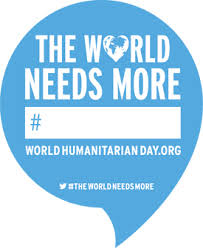As I write, I am representing the #UK in an open session of the Africa Union’s #(AU) Peace and Security Council #PSC in Addis Ababa to commemorate World Humanitarian Day #WHD2014 – a date which marks, of course, the horrific bombing of #UN Headquarters in Baghdad in 2003.
It seems today that the humanitarian system is being stretched ever further and further, working hard to respond to growing needs created by conflict, a changing climate, and a growing global population. While many parts of #Africa are now graduating from poverty, there are areas at huge risk of being left behind. In the man-made humanitarian crisis in South Sudan, in the Central African Republic #CAR, in the #Sahel and in #Somalia, to name just a few, there are millions in need of assistance. We know that it is likely droughts and floods will intensify in future, still further threatening food supplies and livelihoods in such areas. But it is an insult to our shared humanity that some of these crises are man-made, bringing suffering to millions for the interests of a selfish few.
And at the same time the challenges of delivering aid in many areas are increasing, with civilians and aid workers under fire and sometimes working despite restrictive environments imposed by host governments. The risks to aid workers are perhaps nowhere more acute than in the current #Ebola outbreak in West Africa, the largest seen in recent times.
Earlier this year the UK pledged its support to improve global preparedness and coordination of responses, and to increase our investment in building resilience to crises at local and national levels. The international system alone cannot manage all the crises of the future, and nor should it need to. I am impressed by the number of countries that have put in place innovative social protection programmes, creating safety nets for those who need them. I also applaud the engagement by the AU and its member states in the Africa Risk Capacity – an innovative scheme to allow African Governments to manage risk across the continent and enable faster responses to crises – which was launched with UK and German support this year. At the same time local communities in many areas are also stepping forward to shoulder humanitarian burdens.
We have a long way to go, but today we should take a moment to celebrate the achievements of the humanitarian community in bringing help to those who need it now – as well as reminding ourselves of the need to work together to build resilience among the most vulnerable to the crises of tomorrow.

